
What are arrhythmias and their importance in paediatric population?
Arrhythmia means abnormal heart rhythm. Heart rate can be too low or too high and sometimes irregular also. Arrhythmias in paediatric patients are different from adult. It can affect foetus , neonate, infants and toddlers also and have varied aetiology. In some arrhythmias patient feels mild discomfort, while in others, it can lead to heart failure and rarely death.Paediatric cardiologist or arrhythmiologist are expert in the management of this heart rhythm problems.
Different varieties of arrhythmias:
Arrhythmias can be classified as
- Bradycardia: Heart rate is abnormally lower than normal. Common causes of bradicardia are complete heart block, sinus node dysfunction, sino atrial block, post cardiac surgery etc. Complete heart block is result of Anti Ro or Anti LA antibodies present in mother and develops before birth.
- Tachycardia: Heart rate is abnormally higher than normal. They are of following types:
- Supraventricular tachycardias: They are most common and result from presence of abnormal electrical connection in heart. Other causes include abnormal foci which generate current, post cardiac surgery scar. Though most can be terminated, they is a risk of heart failure among these patients.
- Ventricular tachycardia: These are potentially life threatening arrhythmias and can lead to sudden death.. There is abnormal current movement in ventricles and heart can not pump blood. They result from abnormal ion channels (Long QT syndromes( incidence 1 in 4000), Brugada Syndrome, short QT syndrome, etc), thickened myocardium ( hypertrophic or dilated cardiomyopathy( 1 in 400)), scar on heart muscle ( post cardiac surgery, particularly at high risk), etc. Quite a few syndromes run in family therefore family screening is indicated.
Consult doctor
Common symptoms:
Patient of bradycardia presents with fatigue, syncope ( faint) and occasionally heart failure.
While, patients with tachycardia can have sensation of palpitation, light headedness or syncope. Ventricular tachycardia can lead to sudden death and sometimes mimic like seizure disorder.
How to diagnose these arrhythmias?
Most important step in diagnosis of arrhythmia is ECG which records electrical activity of heart. In a few cases specialized devices like Loop recorder may be required. 2D Echo can help to rule out structural or associated defect. Some arrhythmia can present before or immediately after birth. Fetal echo can help to diagnose them.
What are management strategies?
It depends upon nature of problem. For patients with bradycardia ( complete heart block) , permanent pacemaker helps to increase and maintain desired heart rate.
Supraventricular tachycardia can be suppressed with drugs, where as hose with abnormal connection in heart can be cured with electrophysiology study.
Management of ventricular tachycardia is difficult. Drug therapy is cornerstone to decrease risk of sudden death. Implantable cardiac defibrillator and sympathectomy may be required in resistant cases.
What are restrictions for these babies?
Patients with ventricular tachycardia are restrained from participating in competitive sport as later can increase risk of sudden death. Swimming in particular is notorious to precipitate event in long QT syndrome.
Drugs that prolong QT interval should be avoided. E.g. clarithromycin, erythromycin, ketoconazole, quinidine, etc
Consult your doctor for more details.







REPLY COMMENT